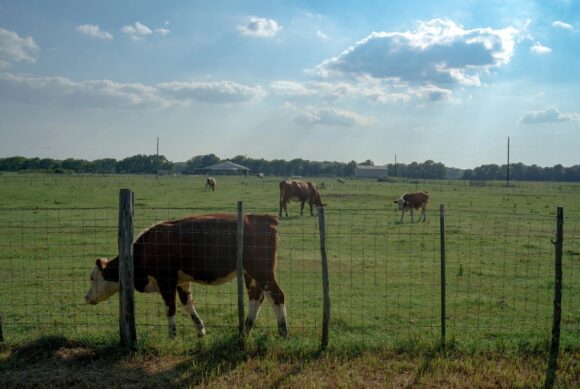FORT WORTH — Rising public concern in Texas over PFAS, or “forever chemicals” linked to cancer, infertility and immune disorders sparked lawmakers to file half a dozen bills to study the chemicals, regulate them in sewage sludge and ban them in firefighting foam for some uses.
But despite backing by lawmakers from both sides of the aisle and urgent pleas from farmers grappling with poisoned land and dead cattle, none made it to the governor’s desk.
Evidence of PFAS contamination across Texas is growing. U.S. Environmental Protection Agency data shows that at least 50 public water systems in Texas have exceeded federal limits for PFAS in drinking water. In North Texas, farmers have alleged that fertilizers made from municipal waste contaminated their land with PFAS and poisoned their livestock. And firefighting foams containing PFAS can run off into nearby bodies of water.
The chemicals are used in thousands of other household items including nonstick cookware, pizza boxes, toilet paper, soaps and rain jackets. They don’t break down and can remain in water and soil indefinitely.
Here’s what happened to the major PFAS-related bils this session:
Sewage-based fertilizer bill
House Bill 1674, by Rep. Helen Kerwin, R-Cleburne, was filed after her rural district became ground zero for PFAS contamination in Texas. Farmers in Johnson County sued a fertilizer company last year alleging that PFAS-contaminated fertilizer made from Fort Worth’s municipal waste poisoned their land, killed their livestock, and left them unable to sell anything produced on their farms.
One farming family lost over 30% of their cattle. Others saw their land ruined. The county declared a disaster earlier this year and begged the state to act.
Kerwin’s bill would have required companies that manufacture products made from biosolids to test them monthly for certain PFAS before selling them, post results online, and incinerate or dispose in a landfill anything that tested too high. Violators could have faced criminal penalties.
At a committee hearing in May, affected farmers and other witnesses, some who waited more than 18 hours, testified in favor of the bill. But opposition from groups representing the chemical industry and wastewater utilities, concerned about cost and limited disposal alternatives, was enough to stall the bill, which died without making it out of committee.
“I don’t see it as a failure,” Kerwin said. “With the success of having the hearing we have elevated the awareness of PFAS. The next step is to make this a statewide awareness.”
Kerwin said she plans to reintroduce a broader version of the bill next session. She’s coordinating with county judges across the state, including Ellis and Wise counties, to test land, water and soil for PFAS. Kerwin says counties will need to be the “go-getters” on this issue.
“We just had samples from one farm,” she said. “We need to make sure the bill has enough testing throughout the state, make it a bill that has a lot of proof, scope and some good witnesses all over the state. ”
Still, the loss stings, said Johnson County farmer Tony Coleman. Coleman and other farmers who asked for help now must wait another two years.
“So animals need to keep dying for two years until we can make this a priority?” Coleman said. “It’s a lot of mixed emotions going on right now. You want to feel like people are for you, but we’d rather politic than dig deep and solve the problem.”
“Forever chemicals” studies
House Bill 1730 by Rep. Penny Morales Shaw, D-Houston, would have launched a state study of PFAS and learn where the chemicals are, how they affect human health and which Texas communities are most at risk.
The bill would have tasked the University of Houston and state agencies with investigating PFAS in drinking water, firefighting gear and food packaging.
Adrian Shelley, Texas director of the public interest nonprofit Public Citizen, said that he felt pretty good about the prospects of the bill. This year saw half a dozen bills filed related to PFAS and lawmakers across the state — from both parties — indicated their support.
“You’d like to see some action. A study is often the kind of modest outcome that you can expect,” Shelley said. His hope quickly faded when he saw the two of the biggest industry groups, the Texas Chemistry Council and the Texas Oil and Gas Association, oppose the bill arguing that a state study would duplicate federal efforts.
“A Texas study is unlikely to generate additional value or information in an already crowded research space at the federal level,” Logan Harrell with the Texas Chemistry Council, testified at a committee hearing for the bill.
Shelley said opposition from those two groups is often sufficient to kill a piece of legislation.
Morales Shaw said that industry may have “put up the barriers this time, but eventually, those barriers won’t withstand the outpouring of constituents coming together speaking up. We hope that industry will just get on board … let’s collaboratively go forward and make better policy choices.”
The bill made it out of committee but died without receiving a vote by the full House.
Luke Metzger, executive director of the nonprofit Environment Texas, said the study could have opened the door to greater liability for PFAS manufacturers as growing evidence links some of their products to illnesses in people and livestock.
Texas remains one of the few large states with no comprehensive plan for understanding PFAS exposure. Thirty other states have adopted policies addressing PFAS.
Another bill by Morales Shaw, House Bill 1145, would have studied PFAS use in hydraulic fracturing. It died in a committee without receiving a hearing. So did House Bill 3738, by Rep. Joanne Shofner, R-Nacogdoches, which would have studied whether PFAS were present in food served to students in school lunches.
Restricting use of PFAS-laced firefighting foams
Senate Bill 1898 by Rep. Ann Johnson, D-Houston, would have banned the use of PFAS-laced firefighting foams for training and testing, unless used in specially contained facilities or legally required. Several states have similar bans, including California, Colorado, Maine, Connecticut and Kentucky.
The bill had momentum, made it out of both committees, and passed in the Senate. This bill came the closest to receiving a final approval. However, it ran out of time before the House could vote on it.
“While it’s good that [some] bills did get so far, we still end the session where we started with absolutely no state action on this problem, and that’s incredibly frustrating, given how harmful this is and how well documented the problem is,” Metzger said.
Disclosure: The University of Houston has been a financial supporter of The Texas Tribune, a nonprofit, nonpartisan news organization that is funded in part by donations from members, foundations and corporate sponsors. Financial supporters play no role in the Tribune’s journalism. Find a complete list of them here.
This article originally appeared in The Texas Tribune at https://www.texastribune.org/2025/06/02/texas-pfas-forever-chemicals-bills-legislation-fail/.
The Texas Tribune is a member-supported, nonpartisan newsroom informing and engaging Texans on state politics and policy. Learn more at texastribune.org.
Photo: Cattle graze in Grandview on Aug. 5, 2024. Some farmers in Johnson County have filed a lawsuit claiming that fertilizer tainted with “forever chemicals” poisoned their land and their livestock. A bill to address the issue failed in the Legislature. Credit: Azul Sordo for The Texas Tribune
Topics Texas Legislation
Was this article valuable?
Here are more articles you may enjoy.



 Florida Insurance Costs 14.5% Lower Than Without Reforms, Report Finds
Florida Insurance Costs 14.5% Lower Than Without Reforms, Report Finds  AI Claim Assistant Now Taking Auto Damage Claims Calls at Travelers
AI Claim Assistant Now Taking Auto Damage Claims Calls at Travelers  AI Needs Its Own Risk Class: Lockton Re
AI Needs Its Own Risk Class: Lockton Re  Jury Finds Johnson & Johnson Liable for Cancer in Latest Talc Trial
Jury Finds Johnson & Johnson Liable for Cancer in Latest Talc Trial 

